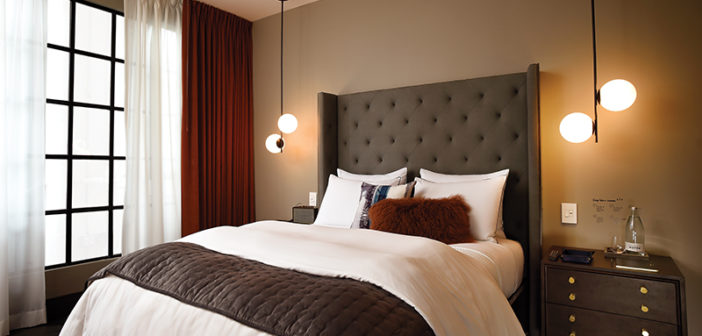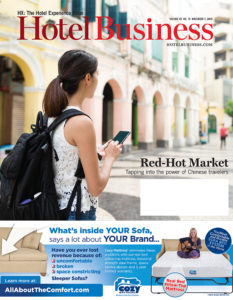NATIONAL REPORT— Bulgari. Karl Lagerfeld. Versace. Armani. Baccarat. West Elm. Restoration Hardware. Equinox. What do all of these names have in common? They’re companies you’ve heard of—and they’ve identified hospitality as a prime place to diversify their brands.
Some have entered into partnerships with management companies to operate the properties, while others are creating hospitality divisions led by industry vets, but all are lending their names to hotels. “[This trend is] being driven by the fact that brand owners, especially popular consumer brand owners, are always looking for ways to expand their reach, not only from the perspective of touching new demos but also looking for additional ways to monetize their brands and the goodwill in their brands,” said Lee Eulgen, a partner at Neal Gerber & Eisenberg and co-chair of the firm’s hospitality & leisure group.
Peter Fowler, VP of hospitality + workspace, West Elm, explained the company’s reasoning for entering the hotel market, which has been done in partnership with management and development company DDK: “It’s a natural next step, as we are evolving from home furnishings to a purpose-driven brand, and recognize the opportunities to harness the power of design and human connection to create rich and relevant experiences for our customers. We expect that West Elm Hotels will broaden our brand reach and we will measure its success based on our ability to create exceptional customer experiences and loyalty to West Elm.”
Of course, it is true that many traditional hotel brand companies have also added new brands recently, but Eulgen noted consumer brands have an edge. “In the lifestyle space in the hospitality industry, there needs to be significant marketing investment in identifying for the consumer what the brand proposition is,” he said. “With these brands, the brand proposition is already well-identified. It’s attractive both for the brand owner and the management company in that there’s less heavy lifting to educate consumers.”
Tony Kurz, CEO of Brandmark Collective BV, which has an exclusive, long-term license agreement with Karl Lagerfeld Group for Karl Lagerfeld Hotels, agreed. “Karl Lagerfeld Hospitality is building a unique, developer-focused brand that combines innovative design and service, whilst also celebrating the creative genius of Karl Lagerfeld. Specifically, Karl Lagerfeld has an inbuilt customer base spanning multiple brands to ensure relevance, brand recognition and aspiration.”
But while many of these brands have recognizable names, the focus should be on experience, not commoditizing travel. Kurz added, “The hotels will be based on experiences, and not on retail—the guest experience that is customized for maximum enjoyment, and little touches to make the experience more memorable.”
For his part, Fowler agreed, noting that West Elm Hotels won’t just be a way to showcase the company’s furniture lines. “We believe there is a meaningful gap in the hotel market, and West Elm Hotels will offer a differentiated experience from the major hotel chains and the geographically limited specialty players—a national hotel brand that is wholly focused on the unique character of each location and its surrounding community. While our hotels will include products from existing West Elm collections to reflect the brand, along with some specifically designed for that property, each location will also feature a mix of locally made items to reflect the character and talent of its community.”
From the legal perspective, there are a number of factors to take into consideration: brand owners need to carefully consider the management companies they partner with; contractually ensure that there is a long-term plan in place for sustained success; identify the right ownership groups and property locations; and make sure their partners are sufficiently capitalized, not only for the opening but for long-term upkeep.
“A big risk to these entrants would be partnering with a management company that has a very short-term view looking to make an opening splash, primarily focused on a near-term, three-to-five-year return that doesn’t have a long-term plan to focus on a consistent long-term marketing message that’s going to appeal over a significant time horizon,” said Eulgen. “As we know from observing events in the hospitality industry, brands can degrade quickly if not consistently curated over time. It’s not as simple as licensing your brand to a random manager and hoping for success. There needs to be a lot of oversight. The other thing that’s key is making sure the locations are good and the owners are quality so that the location is consistent with the already identified brand messaging.”
Eulgen noted that this risk is especially punctuated for luxury brands. “Frankly, that’s a risk for all of these entrants because none are particularly budget oriented.”
For its part, West Elm is not treating hotels like a flash in the pan, but an opportunity for sustained growth. “Our focus is overall brand growth—how we can move from a $1-billion brand to a $2-billion brand—and we’re constantly challenging ourselves to expand our scope from home furnishings to design that impacts everyday life at home, work and away,” he said, adding that the company is currently targeting mid-size cities with rich histories. “Over time, our brand will have national reach, including the gateway markets of New York, Los Angeles, San Francisco and Chicago, and we hope to have additional locations to announce soon.”
Another advantage for many of these brands is that they’ve dipped their toes into hospitality. West Elm, for instance, has worked with SpringHill Suites by Marriott to create an exclusive assortment of furniture and accessories for the brand, while Karl Lagerfeld and other fashion designers have lent their creative hand to hotel design. “Karl, in the past, has been asked to design and/or concept projects—from Sofitel So Singapore to suites in Hotel de Crillon Paris,” remarked Kurz. “Those projects, as well as the [current]Macau project, really are the reason Karl Lagerfeld saw the opportunity to wrap everything up into a brand that is as much about experiential hospitality as it is about design.”
Eulgen also said any brand thinking about entering hospitality “would be well-served to plan ahead by making trademark filings ahead of having a firm deal on the table. Brand owners need to protect their brand in the hotel and resort category if they want to enter that category—the sooner the better.”
And despite the crowded brand space, Eulgen sees this trend continuing. (In fact, between the time he spoke with Hotel Business and press time, Karl Lagerfeld joined the growing number of brands.) “Given the benefit of built-in brand messaging and audience in an increasingly crowded field of hotel brands, it’s going to remain attractive for owners and management companies to give it a shot,” he said. “I’m interested to see what the next market entrants will be. I’m sure there will be more coming in the near future.” HB


